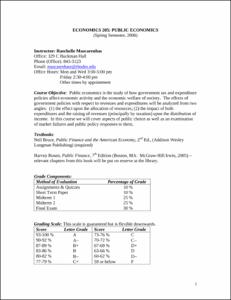Please use this identifier to cite or link to this item:
http://hdl.handle.net/10267/1241Full metadata record
| DC Field | Value | Language |
|---|---|---|
| dc.contributor.author | Mascarenhas, Raechelle | - |
| dc.date.accessioned | 2008-02-28T15:55:38Z | - |
| dc.date.available | 2008-02-28T15:55:38Z | - |
| dc.date.issued | 2008-02-28T15:55:38Z | - |
| dc.identifier.uri | http://hdl.handle.net/10267/1241 | - |
| dc.description | The purpose of this course is to introduce to you the principles of microeconomics. Part of the course will acquaint you with the technical vocabulary of economics where words in everyday use take on specific meanings. The word "cost", for example, has a very precise meaning when used by an economist and this meaning is quite different from the use of the word in casual conversations. It is extremely important that you grasp the exact meanings of all such terms and are able to use them correctly. The other part of the course will be analytical where conceptual ideas will be introduced and explained. It will be shown how an economist thinks and how his/her methodology is somewhat different from those of other social sciences. As part of the course we will try to understand how and when markets work and deal with how prices and quantities are determined in the market place and how firms determine what goods and services to produce. Real world problems and phenomena will be studied using the "economic" methodology. The single most important factor affecting how well you will do in this course is the extent to which you develop logical thinking. Economic theory develops logically and requires constant attempts at understanding everyday phenomena. It is imperative that you study on a regular basis. Rote memorization is not enough for this course. In addition to the text you are encouraged to read the economics/business section of a national newspaper/magazine like The Wall Street Journal, The Economist, and The New York Times. | en_US |
| dc.description.abstract | Public economics is the study of how government tax and expenditure policies affect economic activity and the economic welfare of society. The effects of government policies with respect to revenues and expenditures will be analyzed from two angles: (1) the effect upon the allocation of resources; (2) the impact of both expenditures and the raising of revenues (principally by taxation) upon the distribution of income. In this course we will cover aspects of public choice as well as an examination of market failures and public policy responses to them. | en_US |
| dc.language.iso | en_US | en_US |
| dc.publisher | Memphis, Tenn. : Rhodes College | en_US |
| dc.relation.ispartofseries | Syllabi CRN | - |
| dc.relation.ispartofseries | 20230 | - |
| dc.rights | Rhodes College owns the rights to the digital objects in this collection. Objects are made available for educational use only and may not be used for any non-educational or commercial purpose. Approved educational uses include private research and scholarship, teaching, and student projects. For additional information please contact archives@rhodes.edu. Fees may apply. | - |
| dc.subject | Economics, Department of | en_US |
| dc.subject | Syllabus | en_US |
| dc.subject | Curriculum | en_US |
| dc.subject | Academic departments | en_US |
| dc.subject | Text | en_US |
| dc.subject | 2006 Spring | en_US |
| dc.title | ECON 205-01, Public Economics, Spring 2006 | en_US |
| dc.type | Syllabus | en_US |
| Appears in Collections: | Course Syllabi | |
Files in This Item:
| File | Description | Size | Format | |
|---|---|---|---|---|
| 2006_spring_ECON_205.pdf | 41.03 kB | Adobe PDF |  View/Open |
Items in DSpace are protected by copyright, with all rights reserved, unless otherwise indicated.